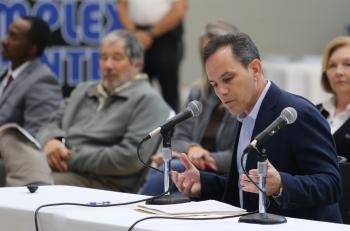
St. Martin Parish President Guy Cormier talks Monday to members of the Restore Louisiana Task Force in Youngsville.
Officials say flood victims are drowning in red tape
YOUNGSVILLE – Louisiana Gov. John Bel Edwards and other state officials are asking for more federal money to help Louisiana residents recovering from the devastating March and August floods.
They’re also asking the feds to loosen what they feel are burdensome regulatory strings attached to the money.
Members of the governor’s Restore Louisiana Task Force were at the Youngsville Sports Complex on Friday to field to hear from officials what Louisiana needs to hasten recovery.
Host Mayor Ken Ritter of Youngsville said his city, the hardest-hit in Lafayette Parish with 600 homes damaged by the August floods, looks on the surface to be back to normal. But that’s just a façade, Ritter said.
The flood happened at a time when the downturn in the oil industry robbed many Youngsville residents of good incomes, Ritter said. The city also needs funding for repairs to roads and sewage system lift stations.
St. Martin President Guy Cormier said the August floods affected 1,450 homes in his parish, where more than 80 percent of homes were not covered by the National Flood Insurance Program. Because of the way the water flowed, Cormier said, some St. Martin homes had water in them for weeks.
Cormier pushed for regional cooperation to develop flood control strategies.
“What we learned in this event is that water doesn’t know if you’re a Democrat or a Republican,” Cormier said. The same is true of race and income, he said.
Restore Louisiana has come under fire because the $1.6 billion in aid already approved by Congress has yet to reach the 193,000 families in 54 parishes affected by the March floods in north Louisiana or the August floods in the south.Officials at Friday’s meeting said they have the action plan required for acquiring 2016 flood aid through the U.S. Department of Housing and Development. But HUD can take up to five months to make its decision.
“On the state side, there has never been a delay,” Edwards’ deputy chief of staff, Julie Baxter Payer, told the task force members.
That’s not the only problem state officials see with federal aid.
One difficulty is the plight of homeowners who sought Small Business Administration loans to restore their homes soon after the floods. Aside from the burden of the loan repayments, the Stafford Act may prevent those who took out SBA rebuilding loans from receiving future grants.
“What we’re hearing,” said task force member Richard Dartez, “is that a lot of good people took the initiative on their own and started rebuilding … and some of those loans go out 30 years.”
Officials are hoping Washington will offer some sort of reimbursement or loan forgiveness.
“That’s a heavy lift,” Payer said. “It’s not something that’s done very often.”
Another obstacle: Because HUD’s mission is to provide housing assistance to low- and moderate-income families, its rules require that 70 percent of its aid go to people who fit those categories. State officials are hoping to see the standard lowered to 50 percent, making more Louisiana families eligible for aid.
State officials are also anxious to see an easing of rules requiring environmental assessments that they said might apply to work as simple as replacing an air conditioner. Those requirements could soak up $104 million in aid that could otherwise go to flood victims, said Patrick Forbes, executive director of Louisiana Office of Community Development.
The governor will go to Washington next month to seek another $2 billion flood aid: about $1.3 billion for homeowners, $80 million for rentals, $58 million for business and agriculture, and $600 million for infrastructure needs like those in Youngsville.
“The bottom line is we don’t want to be forgotten,” Ritter said. “We’re resilient, but we don’t want to be left behind. We don’t want to be the Rita after Katrina.”
Ritter referred to the feeling of some in Louisiana that the suffering of victims of Hurricane Rita in 2005 was overshadowed by Katrina's devastation a month earlier.
This story has been corrected to fix an incorrect date.
- Log in to post comments
